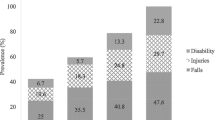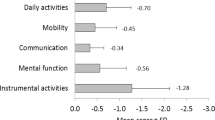Abstract
Objectives
Association between cognitive frailty as identified by a new operational definition and incident disability in the community setting remains unclear. This will be the catalyst for preventive interventions designed to treat adverse health problems among elderlies.
Design
A 24-month follow-up longitudinal study on a community-based cohort.
Setting
Community-setting.
Participants
Participants included a total of 9,936 older adults aged 65 years or older.
Measurements
Frailty was characterized as slow walking speed or/and muscle weakness represented by grip strength. Cognitive function was assessed according to several tests. Cognitive impairment was defined below the age-education reference threshold. Participants were categorized into the four groups: robust, cognitive impairment alone, frailty alone, and cognitive frailty (both frail and cognitive impairment). Incident disability data was extracted from the Japanese Long-Term Care system.
Results
The prevalence of cognitive frailty was 11.2%. The cumulative incidence rates of incident disability in each group were also estimated (robust, 9.6/1,000 person-years (95% CI 7.9 to 11.7); cognitive impairment, 21.3/1,000 person years (95% CI 16.3 to 27.7); frailty, 45.4/1,000 person years (95% CI 39.5 to 52.3); and cognitive frailty, 79.9/1,000 person years (95% CI 68.6 to 93.1)). Adjusted Cox proportional hazard model revealed that the cognitive frailty group had the highest hazard ratio (HR 3.86, 95%CI 2.95–5.05, P < 0.001).
Conclusions
A proper operational definition was developed to determine cognitive frailty among elderlies. Cognitive frailty is more associated with incident disability in community-setting than cognitive impairment or physical frailty alone.

Similar content being viewed by others
References
Ministry of Health, Labour and Welfare, Annual Report on Health, Labor and Welfare. available at https://www.mhlw.go.jp/toukei_hakusho/hakusho/. Accessed April 30, 2019.
Murray CJ, Vos T, Lozano R, Naghavi M, Flaxman AD, Michaud C, et al. Disability-adjusted life years (DALYs) for 291 diseases and injuries in 21 regions, 1990–2010: a systematic analysis for the Global Burden of Disease Study 2010. Lancet. 2012;380:2197–2223.
Fried LP, Tangen CM, Walston J, Newman AB, Hirsch C, Gottdiener J, et al. Frailty in older adults: evidence for a phenotype. J Gerontol A Biol Sci Med Sci. 2001;56:M146–156.
Shamliyan T, Talley KM, Ramakrishnan R, Kane RL. Association of frailty with survival: a systematic literature review. Ageing Res Rev. 2013; 12:719–736.
Makizako H, Shimada H, Doi T, Tsutsumimoto K, Suzuki T. Impact of physical frailty on disability in community-dwelling older adults: a prospective cohort study. BMJ Open. 2015;5:e008462.
Garre-Olmo J, Calvo-Perxas L, Lopez-Pousa S, de Gracia Blanco M, Vilalta-Franch J. Prevalence of frailty phenotypes and risk of mortality in a community-dwelling elderly cohort. Age Ageing. 2013;42:46–51.
Collard RM, Boter H, Schoevers RA, Oude Voshaar RC. Prevalence of frailty in community-dwelling older persons: a systematic review. J Am Geriatr Soc. 2012;60:1487–1492.
Dartigues JF, Amieva H. Cognitive frailty: rational and definition from an (I.a.N.a./i.a.g.g.) international consensus group. The journal of nutrition, health & aging. 2014; 18:95.
Shimada H, T, Lee S, Makizako H, Chen LK, Arai H. Cognitive Frailty Predicts Incident Dementia among Community-Dwelling Older People. J Clin Med. 2018;7.
Solfrizzi V, Scafato E, Seripa D, Lozupone M, Imbimbo BP, D’Amato A, et al. Reversible Cognitive Frailty, Dementia, and All-Cause Mortality. The Italian Longitudinal Study on Aging. Journal of the American Medical Directors Association. 2017; 18:89 e81–89 e88.
Sugimoto T, Sakurai T, Ono R, Kimura A, Saji N, Niida S, et al. Epidemiological and clinical significance of cognitive frailty: A mini review. Ageing Res Rev. 2018;44:1–7.
Liu LK, Chen CH, Lee WJ, Wu YH, Hwang AC, Lin MH, et al. Cognitive Frailty and Its Association with All-Cause Mortality Among Community-Dwelling Older Adults in Taiwan: Results from I-Lan Longitudinal Aging Study. Rejuvenation Res. 2018;21:510–517.
Folstein MF, Robins LN, Helzer JE. The Mini-Mental State Examination. Arch Gen Psychiatry. 1983;40:812.
Shimada H, Makizako H, Doi T, Yoshida D, Tsutsumimoto K, Anan Y, et al. Combined prevalence of frailty and mild cognitive impairment in a population of elderly Japanese people. Journal of the American Medical Directors Association. 2013;14:518–524.
Shimada H, Suzuki T, Suzukawa M, Makizako H, T, Yoshida D, et al. Performance-based assessments and demand for personal care in older Japanese people: a cross-sectional study. BMJ Open. 2013;3.
Chen LK, Liu LK, Woo J, Assantachai P, Auyeung TW, Bahyah KS, et al. Sarcopenia in Asia: consensus report of the Asian Working Group for Sarcopenia. Journal of the American Medical Directors Association. 2014;15:95–101.
Makizako H, Shimada H, Park H, Doi T, Yoshida D, Uemura K, et al. Evaluation of multidimensional neurocognitive function using a tablet personal computer: test-retest reliability and validity in community-dwelling older adults. Geriatr Gerontol Int. 2013;13:860–866.
Tamiya N, Noguchi H, Nishi A, Reich MR, Ikegami N, Hashimoto H, et al. Population ageing and wellbeing: lessons from Japan’s long-term care insurance policy. Lancet. 2011;378:1183–1192.
Tsutsui T, Muramatsu N. Care-needs certification in the long-term care insurance system of Japan. J Am Geriatr Soc. 2005;53:522–527.
Yesavage JA. Geriatric Depression Scale. Psychopharmacol Bull. 1988;24:709–711.
Shimada H, Makizako H, Lee S, Doi T, Lee S, Tsutsumimoto K, et al. Impact of Cognitive Frailty on Daily Activities in Older Persons. The journal of nutrition, health & aging. 2016;20:729–735.
Feng L, Zin Nyunt MS, Gao Q, Feng L, Yap KB, Ng TP. Cognitive Frailty and Adverse Health Outcomes: Findings From the Singapore Longitudinal Ageing Studies (SLAS). Journal of the American Medical Directors Association. 2017;18:252–258.
Solfrizzi V, Scafato E, Lozupone M, Seripa D, Giannini M, Sardone R, et al. Additive Role of a Potentially Reversible Cognitive Frailty Model and Inflammatory State on the Risk of Disability: The Italian Longitudinal Study on Aging. Am J Geriatr Psychiatry. 2017;25:1236–1248.
Shimada H, Makizako H, Tsutsumimoto K, Doi T, Lee S, Suzuki T. Cognitive Frailty and Incidence of Dementia in Older Persons. J Prev Alzheimers Dis. 2018;5:42–48.
Makizako H, Shimada H, Doi T, Tsutsumimoto K, Lee S, Lee SC, et al. Age-dependent changes in physical performance and body composition in community-dwelling Japanese older adults. J Cachexia Sarcopenia Muscle. 2017;8:607–614.
Harada CN, Natelson Love MC, Triebel KL. Normal cognitive aging. Clin Geriatr Med. 2013;29:737–752.
Granic A, Davies K, Martin-Ruiz C, Jagger C, Kirkwood TBL, von Zglinicki T, et al. Grip strength and inflammatory biomarker profiles in very old adults. Age Ageing. 2017;46:976–982.
Verghese J, Holtzer R, Oh-Park M, Derby CA, Lipton RB, Wang C. Inflammatory markers and gait speed decline in older adults. J Gerontol A Biol Sci Med Sci. 2011;66:1083–1089.
Metti AL, Aizenstein H, Yaffe K, Boudreau RM, Newman A, Launer L, et al. Trajectories of peripheral interleukin-6, structure of the hippocampus, and cognitive impairment over 14 years in older adults. Neurobiol Aging. 2015;36:3038–3044.
Salanitro AH, Ritchie CS, Hovater M, Roth DL, Sawyer P, Locher JL, et al. Inflammatory biomarkers as predictors of hospitalization and death in community-dwelling older adults. Arch Gerontol Geriatr. 2012;54:e387–391.
Acknowledgment
We would like to thank the Obu city office for help with participant recruitment.
Funding
Funding: This work received financial support via the Health Labour Sciences Research Grant (23–001) from the Japanese Ministry of Health, Labour, and Welfare, and the Research Funding for Longevity Sciences (22–16) from the National Center for Geriatrics and Gerontology (NCGG), Japan. Additional support was provided by a Grant-in-Aid for Scientific Research (B) to H.S. and a Grant-in-Aid for JSPS Fellows from the Japan Society for the Promotion of Science to H. M. The funding source played no role in the design or conduct of the study; collection, management, analysis, or interpretation of the data; or preparation, review, or approval of the manuscript..
Author information
Authors and Affiliations
Contributions
Author contributions: Tsutsumimoto planned the study and wrote the first draft of the manuscript, and coordinated the review and editing process leading to the final manuscript. Doi participated in the design of the study and wrote the paper. Nakakubo, Kim, Kurita and Ishii corrected data and contributed to the editorial process and review of the manuscript. Shimada supervised the study and suggested many of the ideas that have been pursued in this research, and participated in the planning, editorial, and review processes that led to the final manuscript.
Corresponding author
Ethics declarations
Conflicts of interest: none.
Ethical standards: Informed consent was obtained from all participants beforehand. This study’s protocol was approved by the Ethics Committee of the National Center for Geriatrics and Gerontology.
Rights and permissions
About this article
Cite this article
Tsutsumimoto, K., Doi, T., Nakakubo, S. et al. Cognitive Frailty as a Risk Factor for Incident Disability During Late Life: A 24-Month Follow-Up Longitudinal Study. J Nutr Health Aging 24, 494–499 (2020). https://doi.org/10.1007/s12603-020-1365-9
Received:
Accepted:
Published:
Issue Date:
DOI: https://doi.org/10.1007/s12603-020-1365-9




